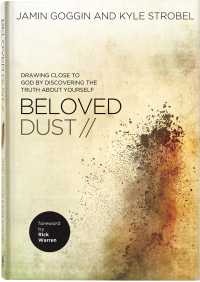We all know what it’s like to feel exposed. We know what it’s like to have the light reveal the dark places we have been trying to hide. In those times, questions of right and wrong rarely enter our minds.
Instead, something clicks on deep inside of us that turns us to the pragmatic. “How can I fix this?” becomes the sole question that captivates our hearts. Our first instinct is to hide.
I see this posture of hiding in my children. When they are exposed, when they are caught doing something wrong, they hide. Each of my children has distinct tactics, but the goal is the same.
My son’s methods are blatant. When he is caught in the act of hitting his sister he will run away and bury his head in the couch so that I cannot see his face.
My daughter usually hides by doing something she thinks will please me. When she does something wrong, she will immediately offer to help clean up or ask if I want to color with her.
My son’s hiding is a bit more obvious and, on the surface, rebellious in nature, but the truth is that my daughter’s strategy is just as problematic. She is seeking to avoid being seen by putting on good character. In effect, she is saying, “Daddy, I don’t believe you can love me in the truth of myself, but I believe you can love the good little girl, so here she is.”
Both my kids are seeking to hide the fact that they have done something wrong. They fear exposure.
Things are vastly different when I am playing hide-and-seek with my kids. They love to play hide-and-seek with me, but they are terrible at it.
I am usually assigned the job of seeker, which is never very challenging. I hardly have the chance to ask the question “Where are you?” before they answer. Within a few seconds of looking, my kids will, without fail, jump out and expose their hiding places. “Here we are,” they both yell in unison.
My kids believe the real essence and joy of the game is in being found, not in hiding. They desire the moment Dad sees them and scoops them into his arms.
As a dad, these contrasting scenes tell me a great deal about my kids. Their postures toward me when we are playing hide-and-seek are completely contrary to their postures toward me when they do something wrong.
When we are playing hide-and-seek, my kids have a posture of exposure and embrace. Even when they are hiding, they are itching to reveal their positions, to be found, hugged, and laughed with.
On the other hand, after doing something wrong, they often have a posture of fear, shame, and avoidance. They don’t want to be seen.
My job as a dad is to ask the same question I do when we are playing hide-and-seek: “Where are you?” My job is to call them out of hiding and to love them in the reality of their brokenness.
“Where are you?” That is the question.
We spend much of our lives hiding; doing everything we can to avoid exposure. We create false selves that have proven to work over the years. They serve to keep our failures, our wounds, and our brokenness out of sight.
We believe this is what allows us to maintain friendships. It is what keeps us safe from relational harm.
However, the truth is it keeps us from knowing real relationship, for it is in being known that we truly experience love. If you want to have vibrant, flourishing, and intimate relationships, there is one catch — you actually have to show up.
A note from Tsh

What you just read from Jamin is an edited excerpt from his new book, Beloved Dust, and he is offering TEN Art of Simple readers an opportunity to win a copy.
Just leave a comment below for a chance to win.



